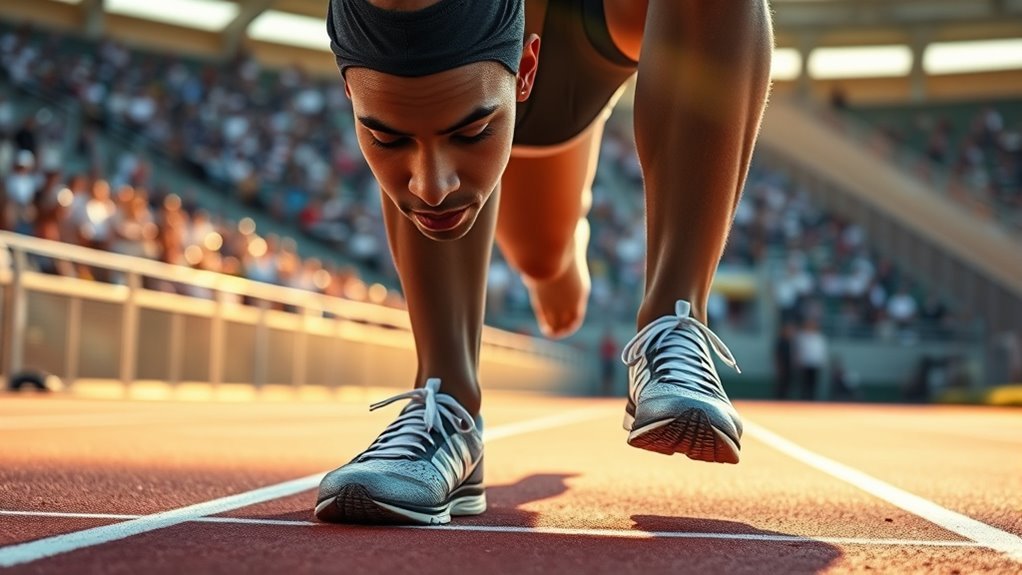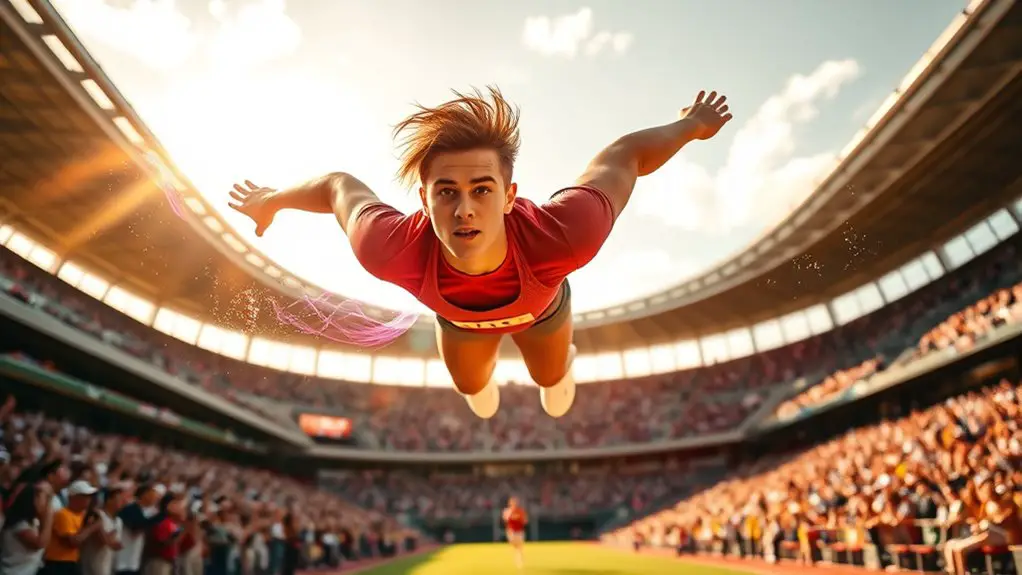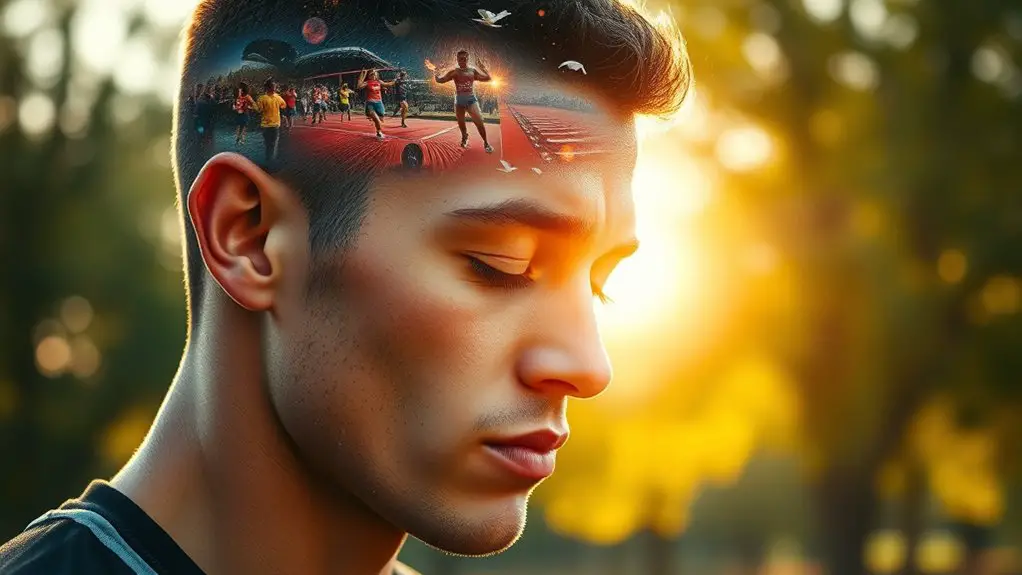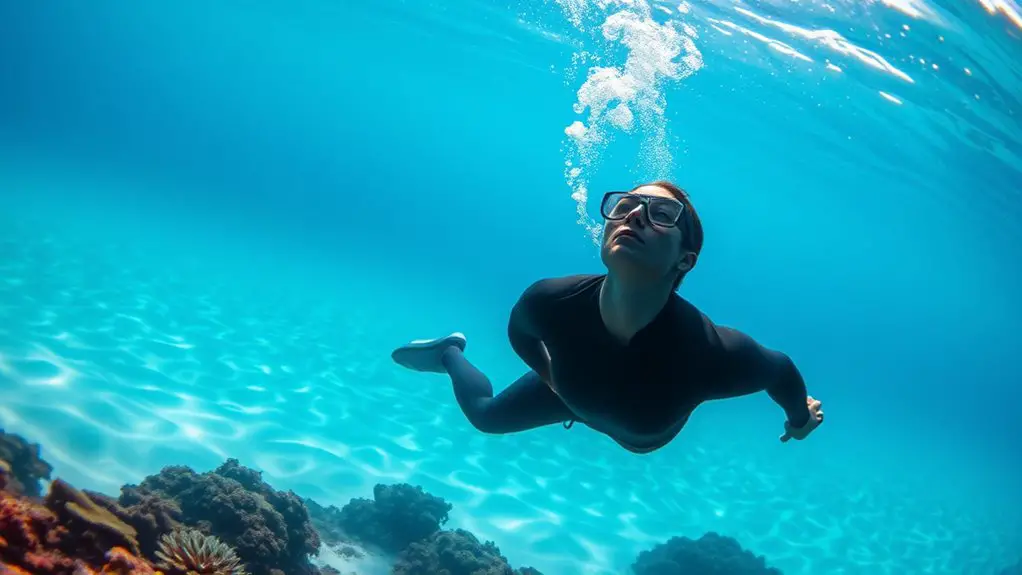Mental preparation enhances your focus in extreme sports by building mental toughness and emotional control. It helps you stay calm under pressure and sharpens your decision-making. Techniques like visualization create vivid images of success, priming your mind for action. Mindfulness practices connect you to the present, reducing distractions. Goal-setting breaks down challenges into manageable steps, keeping you motivated. With these strategies, you can access your true potential. Discover how to fully harness these techniques for peak performance.
The Importance of Mental Conditioning in Extreme Sports
While many might focus solely on physical training for extreme sports, mental conditioning is equally vital. You can't just rely on your body; your mind needs to be sharp and resilient too. Developing mental toughness helps you face challenges head-on, pushing through fear and doubt. It's about cultivating a mindset that thrives in the face of adversity, allowing you to embrace the thrill of freedom that extreme sports offer.
Emotional control plays a significant role as well. When adrenaline kicks in, it's easy to get overwhelmed, but staying calm under pressure can make all the difference. By mastering your emotions, you'll be able to focus on the task at hand, making split-second decisions that keep you safe and enhance your performance. This is where building resilience through challenges becomes crucial, as it prepares you to adapt and overcome tough situations. So, don't underestimate the power of mental training; it's a vital part of your journey toward achieving your wildest dreams in extreme sports.
Visualization Techniques for Enhanced Focus
How can visualization techniques transform your focus in extreme sports? By harnessing the power of guided imagery, you can create vivid mental pictures that enhance your concentration and performance. Imagine yourself soaring through the air, executing each move with precision and grace. This isn't just daydreaming; it's performance visualization that primes your mind for the challenges ahead.
When you visualize your actions, you're training your brain to respond instinctively when it counts. Picture every twist, turn, and landing, and feel the adrenaline rush as if you're living it in real life. This mental rehearsal sharpens your focus, allowing you to break free from distractions and tap into your true potential. Additionally, meditation enhances mental conditioning which can further boost your visualization practice and overall performance.
In the world of extreme sports, where every second counts, embracing these visualization techniques can elevate your game, giving you the freedom to push your limits and truly thrive.
Mindfulness Practices to Stay Present
As you engage in extreme sports, practicing mindfulness can help you stay present and fully aware of your surroundings. One powerful technique is breath awareness. By focusing on your breath, you connect with the moment, letting go of distractions that can derail your performance. Take a deep breath in, feel the air filling your lungs, and exhale slowly—this simple practice can ground you.
Incorporate sensory grounding to enhance your experience. Pay attention to the feel of the wind against your skin, the sound of your heartbeat, or the texture of the equipment in your hands. These sensations anchor you to the present, allowing you to fully embrace the thrill without being overwhelmed. Mindfulness has been shown to enhance focus and reduce anxiety, which are crucial for optimal performance in extreme sports.
Mindfulness isn't just a technique; it's a way to amplify your freedom. By being present, you can release your true potential, making every moment in your extreme sport exhilarating and fulfilling.
The Role of Goal-Setting in Performance
Setting clear goals is essential for maximizing your performance in extreme sports. By using the SMART goals framework, you can create specific, measurable, achievable, relevant, and time-bound objectives that guide your training. Understanding the difference between short-term and long-term goals can also help you stay focused and motivated on your journey. Additionally, setting realistic goals allows you to break larger aspirations into smaller, achievable milestones, further enhancing your confidence and motivation.
SMART Goals Framework
While pursuing extreme sports, having a clear goal can considerably enhance your performance, and that's where the SMART goals framework comes into play. By applying the SMART criteria, you can guarantee your goals are Specific, Measurable, Achievable, Relevant, and Time-bound. This structured approach not only fosters motivation but also helps in aligning your aspirations with your actions.
- Specific: Define exactly what you want to achieve.
- Measurable: Set criteria to track your progress.
- Achievable: Guarantee your goals are realistic and attainable.
- Relevant: Align your goals with your ultimate vision for freedom in your sport.
Short-term vs. Long-term Goals
Achieving success in extreme sports often hinges on balancing short-term and long-term goals. Short-term motivation fuels your daily training and keeps you engaged, pushing you to hit those immediate benchmarks. It's about celebrating small victories that build your confidence and skill. However, without a long-term vision, you might find yourself lost or unfulfilled. That bigger picture guides your journey, reminding you why you take risks and aim for greatness. By integrating both perspectives, you can maintain the passion that drives you while steadily progressing toward your ultimate aspirations. So, set those short-term goals to spark your fire, but always keep your eyes on the horizon, where your dreams await. This balance is the key to thriving in extreme sports.
Building Resilience Through Mental Training
Building resilience through mental training is essential for anyone involved in extreme sports, as it equips you with the tools to face challenges head-on. Resilience training fosters mental toughness, helping you bounce back from setbacks and maintain focus in high-pressure situations. Here's how you can build your resilience:
- Visualization Techniques: Picture yourself overcoming obstacles to reinforce your belief in success.
- Positive Affirmations: Use empowering phrases to cultivate a strong mindset and boost self-confidence.
- Mindfulness Practices: Stay present during your activities, reducing anxiety and enhancing performance.
- Goal Setting: Break down larger challenges into achievable steps, making it easier to tackle them with determination. Additionally, incorporating visualization techniques into your training can significantly enhance your overall athletic performance.
The Science Behind Mental Preparation
Understanding the science behind mental preparation reveals how psychological techniques can enhance performance in extreme sports. By engaging in cognitive training, you tap into your mind's potential, sharpening your focus and decision-making skills. Performance psychology shows that visualizing success, practicing mindfulness, and setting clear goals can considerably elevate your game.
These techniques help you manage pressure and anxiety, allowing you to embrace the thrill of the unknown. When you mentally rehearse your moves and strategies, you're not just preparing for competition; you're fostering a sense of freedom that's essential in extreme sports. Moreover, techniques such as mindfulness in athletic performance can help you tune out distractions and maintain focus during intense moments.
The brain's neuroplasticity means you can rewire your thought patterns, making it easier to access that peak performance state when it counts. In this way, mental preparation becomes a powerful ally, enabling you to face challenges with confidence and resilience. Embrace these methods, and release your true potential on the course, slope, or wave.
Real-Life Success Stories of Mental Focus in Extreme Sports
When you think about extreme sports, mental focus often plays an essential role in athletes' success. You'll see how top competitors use unique mental techniques to overcome challenges and achieve remarkable victories. Let's explore some inspiring stories that highlight how mental preparation can break down psychological barriers. Additionally, understanding the neurobiology of clutch moments can empower athletes to perform at their best during critical situations.
Athletes' Mental Techniques
Although extreme sports often push physical limits, the mental techniques athletes employ are just as essential for their success. You can harness these strategies to elevate your performance and find your flow. Here are some powerful techniques:
- Mental imagery: Visualizing your moves helps solidify your skills and boosts confidence.
- Cognitive rehearsal: Practicing scenarios in your mind prepares you for real-life challenges, making you more adaptable.
- Breath control: Regulating your breath calms nerves, enhancing focus and clarity.
- Positive affirmations: Reinforcing your belief in yourself fosters resilience, empowering you to tackle obstacles head-on.
Notable Competition Triumphs
In extreme sports, mental focus can be the difference between victory and defeat, as demonstrated by countless athletes who've harnessed their mental techniques to achieve remarkable feats. Take the example of a skydiver who visualizes every second of their jump, using competition strategies to adapt mid-air and land flawlessly. Or consider a rock climber who channels their triumph motivation, pushing through fatigue to reach the summit. These athletes don't just rely on physical prowess; they cultivate a mindset that propels them to success. By embracing mental preparation, they find clarity and confidence, enabling them to tackle challenges head-on. Their stories inspire you to explore your own mental focus, showing that with the right mindset, you too can achieve extraordinary results.
Overcoming Psychological Barriers
While many extreme sports athletes face intimidating psychological barriers, their real-life success stories reveal the power of mental focus in overcoming these challenges. By mastering fear management and confidence building, you can break through limitations that once seemed insurmountable.
- Embrace visualization techniques to foresee success.
- Develop a routine that reinforces positive thinking.
- Learn from failures to build resilience.
- Surround yourself with a supportive community.
These strategies not only enhance your performance but also free you from self-doubt. Just like those who've conquered their fears, you can channel your mental strength to elevate your game. Remember, every moment spent in mental preparation is a step toward freedom in the face of adversity.
Frequently Asked Questions
How Can Beginners Start Mental Preparation for Extreme Sports?
Imagine standing on the edge, adrenaline coursing through your veins. To begin your mental preparation for extreme sports, start with visualization techniques. Picture yourself conquering challenges, feeling that rush of freedom. Pair this with breathing exercises to center yourself, calming your mind and body. These practices help sharpen your focus and build confidence, allowing you to embrace the thrill ahead. Remember, each step you take prepares you for the exhilarating journey that awaits!
What Role Does Nutrition Play in Mental Focus for Athletes?
Nutrition's got a huge role in your mental focus as an athlete. When you adopt smart nutrition strategies, like balanced meals rich in carbs and proteins, you fuel both body and mind. Don't forget hydration's importance; staying well-hydrated keeps your cognitive functions sharp. With the right nutrients, you'll find it easier to concentrate and perform at your best, giving you that sense of freedom to push your limits in any sport you choose.
Are There Specific Apps for Mental Training in Extreme Sports?
Imagine you're standing on the edge of a breathtaking cliff, feeling the wind whisper freedom in your ears. To harness that spirit, specific apps can guide you through mindfulness meditation and visualization techniques. These tools help you sharpen your focus, clearing your mind like a calm lake. With each session, you'll build mental resilience, transforming fear into exhilaration, and ultimately enhancing your performance in the wild embrace of extreme sports.
How Does Sleep Impact Mental Preparation and Focus?
Sleep really impacts your mental preparation and focus. When you prioritize sleep quality, you boost your cognitive function, which helps you think clearly and stay sharp. If you're well-rested, you're more likely to react swiftly and make better decisions. On the other hand, poor sleep can leave you feeling sluggish and unfocused, affecting your performance. So, if you want that freedom to excel, don't underestimate the power of a good night's sleep!
Can Mental Preparation Techniques Be Used in Other Sports?
Absolutely, mental preparation techniques can be used in various sports. In fact, studies show that 80% of an athlete's performance is influenced by their mental state. By incorporating sports psychology, you can enhance your focus, manage anxiety, and improve overall performance. Techniques like visualization and positive self-talk aren't just for extreme sports; they're powerful tools for any athlete seeking freedom and confidence in their game. So, why not give them a try?




